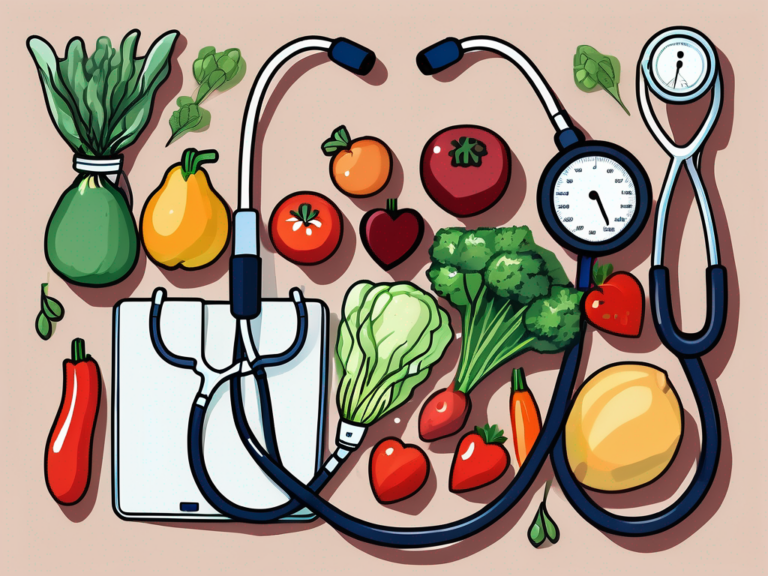How to Assess the Health of Your Heart at Home
Are you concerned about the health of your heart? It’s important to prioritize your cardiovascular well-being, as it plays a vital role in your overall health. By monitoring your heart health regularly, you can detect any potential issues early on and take proactive steps towards a healthier heart. In this article, we will explore the various aspects of heart health and provide you with valuable insights on how to assess the health of your heart in the comfort of your own home.
Understanding the Importance of Heart Health
Before we dive into the specifics of assessing your heart health at home, let’s take a moment to appreciate the significance of maintaining a healthy heart. Your heart is a remarkable organ that tirelessly pumps oxygen-rich blood to every cell in your body. It is the engine that keeps you alive and functioning optimally.
Your heart not only supplies oxygen and nutrients but also carries away waste and carbon dioxide from your body. It is essential for maintaining proper organ function and overall vitality. Recognizing the importance of heart health is the first step towards taking charge of your cardiovascular well-being.
The Role of the Heart in Your Body
Your heart consists of four chambers: two atria and two ventricles, each responsible for specific functions. The atria receive blood returning from the body and lungs, while the ventricles pump freshly oxygenated blood back out to the body and lungs. Additionally, the heart is equipped with valves that regulate blood flow to ensure efficient circulation.
But did you know that your heart is also a symbol of love and emotions? Throughout history, the heart has been associated with feelings of affection, compassion, and passion. It is not just a physical organ but also a metaphorical representation of the deepest human emotions.
Furthermore, your heart has its own electrical system that coordinates the contraction and relaxation of the chambers, enabling a regular heartbeat. This intricate system ensures that your heart beats at a steady rhythm, allowing for the efficient distribution of blood throughout your body. Understanding the intricate workings of your heart will help you better appreciate the significance of monitoring its health.
Why Monitoring Heart Health is Crucial
Regularly assessing the health of your heart allows you to be proactive in preventing potential cardiovascular issues. By detecting heart problems early, you can seek appropriate medical help, follow lifestyle changes, and potentially avoid serious complications.
“A healthy heart is the foundation of a healthy life.”
In addition to preventing potential heart conditions, monitoring your heart health can also serve as a motivator to adopt healthy habits and maintain an active lifestyle. It empowers you to take control and make proactive decisions that benefit both your heart and entire well-being.
Furthermore, maintaining a healthy heart can have a positive impact on your mental well-being. Research has shown that individuals with good heart health are more likely to experience lower levels of stress, anxiety, and depression. This is because a healthy heart promotes proper blood flow to the brain, ensuring optimal cognitive function and emotional well-being.
So, as you embark on your journey of assessing and monitoring your heart health, remember that it is not just about physical well-being but also about nurturing your emotional and mental health. By prioritizing your heart, you are investing in a healthier and happier life.
Basic Anatomy of the Heart
Having a basic understanding of the structure of your heart empowers you to make informed decisions about your cardiovascular health. Let’s explore the key anatomical components of the heart.
The heart is an incredible organ that plays a vital role in keeping you alive and well. It consists of four chambers: the left atrium, right atrium, left ventricle, and right ventricle. These chambers work together harmoniously to pump blood throughout your body, ensuring that oxygen and nutrients reach every cell. It’s like a symphony orchestra, with each chamber playing its part to keep the rhythm of life flowing.
But how does the heart maintain its rhythm and ensure that blood flows in the right direction? Well, that’s where the valves come into play. The heart has valves that act as gatekeepers, preventing backward flow of blood and ensuring that it moves in the correct direction. These valves are like the traffic police officers of your cardiovascular system, diligently directing the flow of blood to where it needs to go.
Understanding the roles of these chambers and valves is crucial in comprehending heart health assessments and potential issues that may arise. By knowing how they work together, you can better appreciate the intricate dance that happens inside your chest with every heartbeat.
The Heart’s Electrical System
Your heart’s rhythm is not left to chance; it is controlled by a sophisticated electrical system. This system ensures that your heart contracts and relaxes in a coordinated manner, maintaining a steady beat throughout your life. It’s like having a built-in conductor that keeps the heart’s symphony in perfect harmony.
At the core of this electrical system are two important nodes: the sinoatrial (SA) node and atrioventricular (AV) node. The SA node, often referred to as the “natural pacemaker,” generates electrical impulses that initiate each heartbeat. These impulses then travel through the AV node, which acts as a relay station, transmitting the signals to the ventricles and coordinating their contraction.
By understanding the importance of the electrical system in maintaining a healthy heartbeat, you will appreciate why monitoring your heart’s rhythm is essential for assessing its overall health. Just like a conductor guides an orchestra, the electrical system guides the heart, ensuring that it beats in perfect rhythm, allowing you to live life to the fullest.
Symptoms of Heart Problems to Watch Out For
Knowing the symptoms associated with heart issues is vital in assessing your heart health at home. Recognizing the warning signs enables you to seek medical attention promptly and take appropriate actions.
When it comes to your heart, it’s important to be aware of both the physical symptoms and the subtle signs that may indicate potential problems. By understanding these symptoms, you can better protect your heart and overall well-being.
Physical Symptoms and Warning Signs
Physical symptoms of heart problems may include chest pain or discomfort, shortness of breath, fatigue, dizziness, and excessive sweating. These symptoms can indicate various heart conditions, including coronary artery disease and heart failure.
It’s crucial to pay attention to your body and recognize when these physical symptoms occur. If you experience persistent or worsening symptoms, it is crucial to consult with a healthcare professional for an accurate diagnosis and appropriate treatment.
Subtle Signs of Heart Issues
While physical symptoms may be more obvious, it is essential to pay attention to subtler signs that may indicate potential heart problems. These signs can include jaw pain, arm discomfort, nausea, indigestion, and even a persistent cough.
Your body communicates with you in various ways, and being attuned to these subtle signs can help you detect potential heart issues that may not present with typical symptoms. It’s important to note that these signs can vary from person to person, so it’s crucial to listen to your body and seek medical advice if you have any concerns.
In addition to these physical and subtle signs, it’s worth mentioning that lifestyle factors can also contribute to heart problems. Factors such as smoking, a sedentary lifestyle, poor diet, and excessive stress can increase your risk of developing heart issues.
By making positive changes to your lifestyle, such as quitting smoking, engaging in regular physical activity, adopting a heart-healthy diet, and managing stress effectively, you can significantly reduce your risk of heart problems.
Tools for Monitoring Heart Health at Home
Advancements in technology have made it easier than ever to assess your heart health from the comfort of your own home. Here, we will explore some tools and devices that can assist you in monitoring your heart health effectively.
Blood Pressure Monitors
One of the most fundamental aspects of assessing your heart health is monitoring your blood pressure. High blood pressure can place excessive strain on your heart, leading to various cardiovascular issues.
Using a reliable blood pressure monitor, you can regularly check your blood pressure at home and maintain a record of your readings. This information can be shared with your healthcare provider to assist in accurate diagnosis and personalized treatment plans.
Heart Rate Monitors
Heart rate monitors are fantastic tools for assessing your heart’s activity during physical exertion or rest. These devices can measure your heart rate accurately and help you identify any irregularities or abnormalities.
By monitoring your heart rate, you can gain valuable insights into how your heart responds to exercise, stress, and various activities. This information can guide you in tailoring your fitness regimes for optimal heart health.
Smartphone Apps and Wearable Devices
In the digital age, smartphone apps and wearable devices have become indispensable resources for monitoring heart health. These apps and devices can track your heart rate, sleep patterns, and physical activity levels, among other data points.
By using these technologies, you can gain a comprehensive understanding of your heart health and make informed decisions on lifestyle modifications to promote a healthier heart.
Furthermore, some smartphone apps and wearable devices offer additional features that can enhance your heart health monitoring experience. For example, certain apps provide personalized recommendations based on your heart rate and activity levels, helping you optimize your daily routines for better cardiovascular health.
Additionally, some wearable devices come equipped with built-in ECG (electrocardiogram) capabilities. This means that you can obtain a more detailed analysis of your heart’s electrical activity, allowing for a more comprehensive assessment of your heart health.
Lifestyle Changes for a Healthier Heart
While monitoring your heart health is crucial, maintaining a healthy lifestyle is equally essential. By making positive changes in your daily routine, you can greatly enhance the health of your heart.
When it comes to diet and heart health, the choices you make can have a significant impact. Strive for a well-balanced eating plan that includes plenty of fruits, vegetables, whole grains, lean proteins, and healthy fats. These nutrient-rich foods provide the necessary vitamins, minerals, and antioxidants that support heart health.
Limiting the consumption of processed foods, trans fats, and foods high in salt and sugar is essential in maintaining a healthy heart. Processed foods often contain added sugars, unhealthy fats, and high levels of sodium, all of which can contribute to heart disease. By opting for fresh, whole foods, you can reduce your intake of these harmful substances and promote heart health.
Staying hydrated is also crucial for a healthy heart. Drinking an adequate amount of water helps maintain proper blood viscosity and ensures that your heart can pump blood efficiently throughout your body. Additionally, moderation in alcohol intake is important, as excessive alcohol consumption can lead to high blood pressure and other cardiovascular problems.
Exercise is another key component of a heart-healthy lifestyle. Regular physical activity strengthens your heart and improves its efficiency. Engaging in aerobic exercises such as brisk walking, cycling, or swimming can help lower blood pressure, reduce cholesterol levels, and maintain a healthy weight. Additionally, incorporating resistance training into your exercise routine can further enhance your heart health and overall fitness.
Remember, even small changes like taking the stairs instead of the elevator or going for a short walk during your lunch break can make a positive impact on your heart health. Finding activities that you enjoy and can incorporate into your daily routine is key to maintaining consistency and reaping the benefits.
While monitoring your heart health at home is an excellent step towards maintaining optimal cardiovascular well-being, it is crucial not to substitute it for regular check-ups with your healthcare provider. Regular check-ups enable your doctor to assess your heart health comprehensively, utilizing advanced medical equipment and expertise. These visits allow for early detection of potential issues and provide a platform for personalized advice and intervention.
By prioritizing a heart-healthy lifestyle that includes a nutritious diet, regular exercise, and routine check-ups, you can take proactive steps towards maintaining a healthier heart. Remember, your heart is the engine that keeps your body running, so it’s worth investing in its long-term well-being.
When to Seek Professional Help
While monitoring your heart health at home is valuable, it is essential to recognize situations where professional help is warranted. Prompt medical attention can make a significant difference in managing heart-related emergencies and potentially saving lives.
Recognizing Emergency Situations
If you experience symptoms such as severe chest pain, shortness of breath, rapid or irregular heartbeat, or loss of consciousness, it is crucial to seek immediate medical assistance. These symptoms may indicate a heart attack or other life-threatening cardiac events.
Do not hesitate to call emergency services or go to the nearest emergency room if you or someone around you is displaying these symptoms. Remember, every second counts in such situations.
Regular Check-ups and Heart Health Screenings
Regular check-ups and heart health screenings are vital in maintaining a comprehensive assessment of your cardiovascular well-being. Your healthcare provider can recommend appropriate screenings based on your risk factors, such as age, family history, and lifestyle choices.
By adhering to regular check-ups and screenings, you can stay ahead of potential cardiovascular issues and take proactive measures to protect your heart.
Consulting with Cardiologists
If you have any concerns about your heart health or receive abnormal results from your self-monitoring efforts, it is essential to consult with a cardiologist. Cardiologists specialize in diagnosing and treating heart conditions and can provide expert guidance on managing your heart health.
They can recommend further diagnostic tests, interpret the results, and develop a personalized treatment plan based on your specific needs.
Furthermore, when seeking professional help, it is important to consider the qualifications and experience of the healthcare professionals you consult. Look for cardiologists who are board-certified and have a proven track record in treating cardiac conditions. You can also ask for recommendations from your primary care physician or trusted friends and family members who have had positive experiences with cardiologists.
In addition to seeking professional help, it is crucial to maintain a healthy lifestyle to support your heart health. This includes eating a balanced diet, engaging in regular physical activity, managing stress levels, and avoiding tobacco and excessive alcohol consumption. By adopting these habits, you can complement the medical care you receive and improve your overall cardiovascular well-being.
Conclusion
Assessing the health of your heart at home is an empowering journey towards a healthier, more vibrant life. By understanding the importance of heart health, recognizing symptoms, utilizing monitoring tools, adopting a heart-healthy lifestyle, and seeking professional guidance when needed, you can take charge of your heart health and live life to the fullest.
Remember, your heart is the essence of your being, and protecting it through regular self-assessment and care is an investment in your overall well-being. Start prioritizing your heart health today, and embrace a future filled with vitality and joy.






